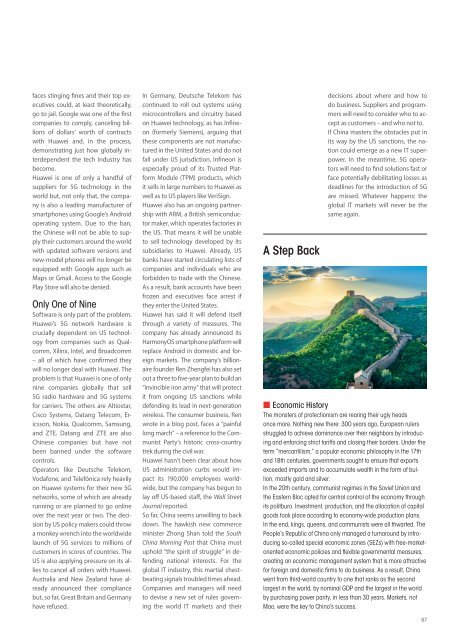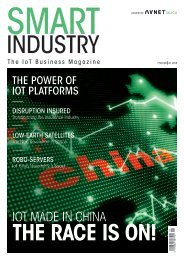Smart Industry 1/2020
Smart Industry 1/2020 - The IoT Business Magazine - powered by Avnet Silica
Smart Industry 1/2020 - The IoT Business Magazine - powered by Avnet Silica
- No tags were found...
You also want an ePaper? Increase the reach of your titles
YUMPU automatically turns print PDFs into web optimized ePapers that Google loves.
faces stinging fines and their top executives<br />
could, at least theoretically,<br />
go to jail. Google was one of the first<br />
companies to comply, canceling billions<br />
of dollars’ worth of contracts<br />
with Huawei and, in the process,<br />
demonstrating just how globally interdependent<br />
the tech industry has<br />
become.<br />
Huawei is one of only a handful of<br />
suppliers for 5G technology in the<br />
world but, not only that, the company<br />
is also a leading manufacturer of<br />
smartphones using Google’s Android<br />
operating system. Due to the ban,<br />
the Chinese will not be able to supply<br />
their customers around the world<br />
with updated software versions and<br />
new-model phones will no longer be<br />
equipped with Google apps such as<br />
Maps or Gmail. Access to the Google<br />
Play Store will also be denied.<br />
Only One of Nine<br />
Software is only part of the problem.<br />
Huawei’s 5G network hardware is<br />
crucially dependent on US technology<br />
from companies such as Qualcomm,<br />
Xilinx, Intel, and Broadcomm<br />
– all of which have confirmed they<br />
will no longer deal with Huawei. The<br />
problem is that Huawei is one of only<br />
nine companies globally that sell<br />
5G radio hardware and 5G systems<br />
for carriers. The others are Altiostar,<br />
Cisco Systems, Datang Telecom, Ericsson,<br />
Nokia, Qualcomm, Samsung,<br />
and ZTE. Datang and ZTE are also<br />
Chinese companies but have not<br />
been banned under the software<br />
controls.<br />
Operators like Deutsche Telekom,<br />
Vodafone, and Telefónica rely heavily<br />
on Huawei systems for their new 5G<br />
networks, some of which are already<br />
running or are planned to go online<br />
over the next year or two. The decision<br />
by US policy makers could throw<br />
a monkey wrench into the worldwide<br />
launch of 5G services to millions of<br />
customers in scores of countries. The<br />
US is also applying pressure on its allies<br />
to cancel all orders with Huawei.<br />
Australia and New Zealand have already<br />
announced their compliance<br />
but, so far, Great Britain and Germany<br />
have refused.<br />
In Germany, Deutsche Telekom has<br />
continued to roll out systems using<br />
microcontrollers and circuitry based<br />
on Huawei technology, as has Infineon<br />
(formerly Siemens), arguing that<br />
these components are not manufactured<br />
in the United States and do not<br />
fall under US jurisdiction. Infineon is<br />
especially proud of its Trusted Platform<br />
Module (TPM) products, which<br />
it sells in large numbers to Huawei as<br />
well as to US players like VeriSign.<br />
Huawei also has an ongoing partnership<br />
with ARM, a British semiconductor<br />
maker, which operates factories in<br />
the US. That means it will be unable<br />
to sell technology developed by its<br />
subsidiaries to Huawei. Already, US<br />
banks have started circulating lists of<br />
companies and individuals who are<br />
forbidden to trade with the Chinese.<br />
As a result, bank accounts have been<br />
frozen and executives face arrest if<br />
they enter the United States.<br />
Huawei has said it will defend itself<br />
through a variety of measures. The<br />
company has already announced its<br />
HarmonyOS smartphone platform will<br />
replace Android in domestic and foreign<br />
markets. The company’s billionaire<br />
founder Ren Zhengfei has also set<br />
out a three to five-year plan to build an<br />
“invincible iron army” that will protect<br />
it from ongoing US sanctions while<br />
defending its lead in next-generation<br />
wireless. The consumer business, Ren<br />
wrote in a blog post, faces a “painful<br />
long march” – a reference to the Communist<br />
Party’s historic cross-country<br />
trek during the civil war.<br />
Huawei hasn’t been clear about how<br />
US administration curbs would impact<br />
its 190,000 employees worldwide,<br />
but the company has begun to<br />
lay off US-based staff, the Wall Street<br />
Journal reported.<br />
So far, China seems unwilling to back<br />
down. The hawkish new commerce<br />
minister Zhong Shan told the South<br />
China Morning Post that China must<br />
uphold “the spirit of struggle” in defending<br />
national interests. For the<br />
global IT industry, this martial chestbeating<br />
signals troubled times ahead.<br />
Companies and managers will need<br />
to devise a new set of rules governing<br />
the world IT markets and their<br />
A Step Back<br />
decisions about where and how to<br />
do business. Suppliers and programmers<br />
will need to consider who to accept<br />
as customers – and who not to.<br />
If China masters the obstacles put in<br />
its way by the US sanctions, the nation<br />
could emerge as a new IT superpower.<br />
In the meantime, 5G operators<br />
will need to find solutions fast or<br />
face potentially debilitating losses as<br />
deadlines for the introduction of 5G<br />
are missed. Whatever happens: the<br />
global IT markets will never be the<br />
same again.<br />
■ Economic History<br />
The monsters of protectionism are rearing their ugly heads<br />
once more. Nothing new there: 300 years ago, European rulers<br />
struggled to achieve dominance over their neighbors by introducing<br />
and enforcing strict tariffs and closing their borders. Under the<br />
term “mercantilism,” a popular economic philosophy in the 17th<br />
and 18th centuries, governments sought to ensure that exports<br />
exceeded imports and to accumulate wealth in the form of bullion,<br />
mostly gold and silver.<br />
In the 20th century, communist regimes in the Soviet Union and<br />
the Eastern Bloc opted for central control of the economy through<br />
its politburo. Investment, production, and the allocation of capital<br />
goods took place according to economy-wide production plans.<br />
In the end, kings, queens, and communists were all thwarted. The<br />
People’s Republic of China only managed a turnaround by introducing<br />
so-called special economic zones (SEZs) with free-marketoriented<br />
economic policies and flexible governmental measures,<br />
creating an economic management system that is more attractive<br />
for foreign and domestic firms to do business. As a result, China<br />
went from third-world country to one that ranks as the second<br />
largest in the world, by nominal GDP and the largest in the world<br />
by purchasing power parity, in less than 30 years. Markets, not<br />
Mao, were the key to China’s success.<br />
87
















